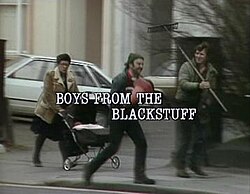Boys From the Black Stuff
| Boys from the Blackstuff | |
|---|---|

The opening of the first episode of the series.
|
|
| Genre | Drama |
| Created by | Alan Bleasdale |
| Starring |
Bernard Hill (as Yosser Hughes) Michael Angelis (as Chrissie Todd) Alan Igbon (as Loggo Logmond) Peter Kerrigan (as George Malone) Tom Georgeson (as Dixie Dean) |
| Country of origin | United Kingdom |
| No. of episodes | 7 (including original Play for Today episode & The Muscle Market) |
| Production | |
| Producer(s) | Michael Wearing |
| Running time | 65 mins approx |
| Production company(s) | BBC (BBC Birmingham) |
| Release | |
| Original network | BBC2 |
| Original release | 1980 – 1982 |
Boys from the Blackstuff is a British television drama series of five episodes, originally transmitted from 10 October to 7 November 1982 on BBC2.
The serial was written by Liverpudlian playwright Alan Bleasdale, as a sequel to a television play, The Black Stuff. The British Film Institute described it as a "seminal drama series... a warm, humorous but ultimately tragic look at the way economics affect ordinary people... TV's most complete dramatic response to the Thatcher era and as a lament to the end of a male, working class British culture."
The television play The Black Stuff was originally written by Bleasdale for BBC1's Play for Today anthology series in 1978. After filming however, the play was not transmitted until 2 January 1980. It concerned a group of Liverpudlian tarmac layers (hence the slang for tarmac: 'the black stuff') on a job near Middlesbrough.
The acclaim that The Black Stuff received on its eventual transmission led to the commissioning of the sequel serial, of which Bleasdale had already written a considerable amount.
The series Boys from the Blackstuff follows the stories of the five now-unemployed men who lost their jobs following the events of the original play The Black Stuff. Set in Bleasdale's home city of Liverpool, and reflecting many of his own experiences of life in the city, each episode focuses on a different member of the group. The series was highly acclaimed for its powerful and emotional depiction of the desperation wrought by high unemployment and a subsequent lack of social support. Although Bleasdale wrote most of the episodes before Margaret Thatcher came to power, the series was noted by many reviewers as a critique of the Thatcher era, which was seen as being responsible for the fate of many of the unemployed lower and working classes, particularly in the North of England. By early 1982, unemployment had reached 3 million (some one in eight of the workforce) as a result of economic recession and restructuring of industry.
The character of Yosser Hughes was widely discussed. He was a man driven to the edge of his sanity by the loss of his job, his wife, the authorities' continued attempts to take his children away from him and his constant attempts at salvaging his male pride (often being the main give-away of his insecurity). His catchphrases, "Gizza' job!" ("give us a job") and "I can do that!" became part of the popular consciousness of the Eighties, summing up the mood of many who sought desperately for work during the era. Hughes was played by Bernard Hill, who uses his Mancunian accent, with slight Scouse vocal mannerisms. The serial also helped to establish the career of Julie Walters, who played the most prominent female role as Angie, the wife of Chrissie, played by Michael Angelis.
...
Wikipedia
